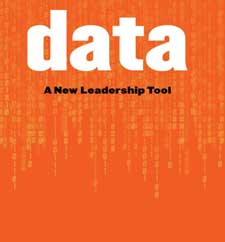 |
|||
| College of Education Home | News & Events | Make a Gift | UW Alumni | |||
|
November 2010 | Return to issue home
Data: a New Leadership Tool
Results. Outcomes. The numbers. The data. With the national spotlight on educational accountability, school leaders are under increased scrutiny. Student assessments are public record, politicians want to link student performance to teacher pay, and it seems everyone knows the educational score. Even real estate offices pass out information to newcomers showing local schools' gaps and gains. There are federal mandates, state standards, and stimulus monies tied to improving data management. Systems are strict, expectations high. "Nobody is operating now without thinking about the accountability system they are part of," says College of Education Professor Mike Knapp, director of the Center for the Study of Teaching and Policy and principal investigator on the center's Study of Leadership for Learning Improvement. In this teach-to-the-test climate, data may be viewed in a punitive light, as enforcement for an inflexible system built around compliance and regulation. But UW's research, funded by The Wallace Foundation, shows data fluency can be one of the most effective tools in a leader's toolbox, a key to diagnosing, monitoring, and developing an open, learning-focused culture. "In the schools we studied, all the principals were bringing data to bear on the critical questions of learning in the school. Data formed the point of conversation about what we are doing, how our kids are doing, what seems to be successful and what doesn't," says UW Professor Bradley Portin, director of the Education Program at the UW Bothell campus and an adjunct faculty member of the College of Education. Districts taking on the task of transforming their relationships with schools also made evidence an integral part of their work throughout the central office. Many district and school leaders in the studies adopted sophisticated data systems with ongoing assessments that could "red alert" individual student performance problems and help leaders adjust teaching strategies and curricula to meet those differentiated needs. The ongoing examination of data provided multiple, regular, objective ways to measure progress tracked to specific goals. Real-time assessments fueled real-time adjustments. "The data is used to drive the instruction, to make sure that students who are not performing are receiving timely remediation in order to get to where they should be," said one principal. These measures also helped identify teachers and school leaders in need of intensive coaching and other professional development. That support can make or break instructional improvement in a school, the UW research shows. "Accountability without support is empty," says College of Education Associate Professor Marge Plecki. "You can shame people with it, blame people with it, but if the accountability system is not built to identify problems, find solutions, then reward the problem-solvers, it's just a simplified finger-pointing exercise that's not appropriate or viable." Data-savvy district leaders made sure information was accessible and understandable to every educator in their districts. They brought in data specialists and assessment coordinators to help teachers and administrators interpret and use incoming streams of data. Teachers who learned to interpret data could use the information to evaluate their own practice and target areas needing improvement. Some school leaders built within-school data systems tailored to the kinds of evidence their staffs found most helpful and useful. In the Atlanta Public Schools, measurement-oriented leadership teams made specific lists of which students were not doing well, came up with a plan to help them, and provided open, ongoing assessments of individual instructional progress. The school superintendent also established targets for schools, comparing progress year to year. The entire system became data literate. Most important, the district uses outcomes to recognize success. When numbers are up, it's cause for celebration in the district. "Atlanta has adopted a culture of recognition," says Plecki. "They celebrate each academic accomplishment in visible ways at district, school, and student levels." November 2010 | Return to issue home | |||
|
|||
